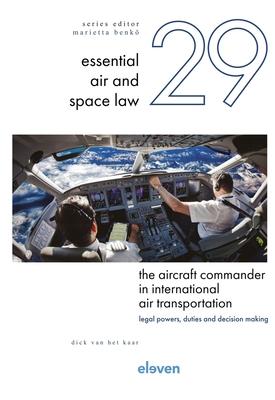At the head of a small but comparatively isolated community, traversing airspaces with various jurisdictions, the aircraft commander must have a defined legal status relating to rights, powers and duties to cope with all issues in international air navigation. This leading personality is responsible for maintaining good order and discipline on board but above all must protect the safety of the aircraft and its occupants during the flight.
His or her rights and responsibilities are dealt with in many national laws and regulations. But no matter how substantively applicable such national legislation might be, its effect ends at the national border - and if regulations on the legal position of the aircraft commander should have any practical value, they must also be effective on an international scale. As yet, however, numerous public international law efforts have failed to reach consensus in this matter. In order to promote and encourage further international debate and the adoption of a codified comprehensive Legal Status of the Aircraft Commander, the author provides an in-depth study and evaluation of air law expert discussions, drafts and deliberations. His work will also be highly relevant to the current debate over plans for fully automated flights in the future - for passenger transportation even without an aircraft commander on board.| FindBook |
有 1 項符合
The Aircraft Commander in International Air Transportation: Legal Powers, Duties and Decision Making Volume 29的圖書 |
 |
The Aircraft Commander in International Air Transportation: Legal Powers, Duties and Decision Making Volume 29 作者:Kaar 出版社:Eleven International Publishing 出版日期:2023-12-12 語言:英文 規格:精裝 / 212頁 / 24 x 16.51 cm / 普通級/ 初版 |
| 圖書館借閱 |
| 國家圖書館 | 全國圖書書目資訊網 | 國立公共資訊圖書館 | 電子書服務平台 | MetaCat 跨館整合查詢 |
| 臺北市立圖書館 | 新北市立圖書館 | 基隆市公共圖書館 | 桃園市立圖書館 | 新竹縣公共圖書館 |
| 苗栗縣立圖書館 | 臺中市立圖書館 | 彰化縣公共圖書館 | 南投縣文化局 | 雲林縣公共圖書館 |
| 嘉義縣圖書館 | 臺南市立圖書館 | 高雄市立圖書館 | 屏東縣公共圖書館 | 宜蘭縣公共圖書館 |
| 花蓮縣文化局 | 臺東縣文化處 |
|
|
內容簡介
作者簡介
Dick van het Kaar LL.M, has been working in the aviation industry for more than 40 years. He started his flying career as a Royal Netherlands Air Force helicopter and jet fighter pilot and instructor. In 1977, he joined the world of commercial aviation and has logged over 23,000 flying hours. During his career as a Senior Captain B747 at KLM/Martinair he studied international law at the Netherlands Open University, where he earned his degree of Masters of Laws. He was a member of the Appeal Council of the Dutch Airline Pilots Association and is the author of a variety of aviation law-related essays, books and articles in a number of international air and space law journals. Following a term of six years as a board member at the Royal Netherlands Aeronautical Association, he now holds the positions of Chairman of the Legal Committee and Senior Advisor on Rules of the Air, Airspace Infrastructure and Environmental Affairs within the same organization. In addition, he is an external examiner associated with the Aviation Academy of the Amsterdam University of Applied Sciences.
|











